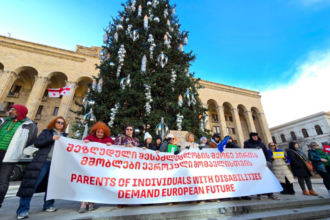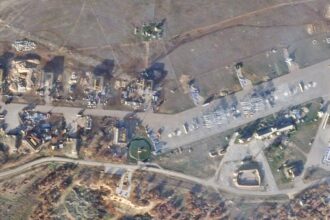Editor’s Note: This story is developing and will be updated.
The Moldovan electoral commission announced that Maia Sandu, the president of Moldova, won the first round of the presidential election in the country on October 20 with almost 39 percent of votes.
The preliminary results are based upon over 93 percent (or 94,444 votes) of the totaled votes.
If no candidate receives a majority of votes, a second voting round will be held on November 3. Sandu is likely to face her main opponent, Alexandr Stoianoglo. Stoianoglo won approximately 28 percent of votes in the first round.
In a referendum held in conjunction with the presidential election, over 52 percent of voters rejected the amendment that would have formally endorsed the path Moldova will take to join the European Union.
The election results were tainted with allegations of Russian interference. Moldovan lawmakers claimed that Moscow spent millions in a campaign against Sandu to defeat him and vote down the EU Referendum.
Since February 2022, tensions between Moscow and Chisinau are increasing amid fears that Russia’s war in Ukraine could spill over into Moldova via Transnistria – a non-recognized breakaway region occupied by Russian forces since 1991.
Maia Sandu, the incumbent pro-Western, had previously accused Moscow in a failed coup of plotting to topple her government.
Throughout the current elections, allegations of Russian interference have been continually raised. Pro-Russian oligarch Ilan Shor was accused of trying influence voters to vote against Sandu. The Kremlin is trying to undermine Moldova’s pro Western leadership.
Authorities in Moldova have reported that more than $15 million in Russian money has been funneled through to 130,000 Moldovans. Voters were also instructed on how they should vote in the upcoming elections. Shor, a Moldovan/Israeli tycoon was accused of laundering money and orchestrating a network despite the fact that his political party had been banned.
Moldova’s state broadcaster reported that vandals splashed paint on the entrance to its building in Chisinau, the capital of Moldova. This incident happened a day after the police attributed similar acts by a group trained in Moscow to destabilize the elections.
In a joint statement released on June 13, the U.S. and U.K. warned against possible Russian interference in Moldovan elections.
The statement stated that if Russia’s election interference in Moldova fails, there is a good reason to believe Moscow would work to incite protests.
Sanda amended the country’s laws on treason shortly after the warning. He extended punishments, and created a new category for laws that assist a foreign state.
On June 25, Moldova began EU accession negotiations in Luxembourg, the same day Ukraine began its long-awaited member negotiations. If the referendum on Oct. 20 was passed, it would have amended Moldova’s constitution to include the EU accession.
A second round of voting is scheduled for Nov. 3 if no candidate receives a majority. The incumbent President Maia Sandu is likely to face off with her main rival, Alexandr Stoianoglo. Stoianoglo won approximately 28 percent of votes in the first round.
According to regional authorities, the injured include four women between the ages of 22 and 53 and five men between 21 and 37. Emergency workers have been sent to the attack sites.
In his evening address of October 20, President Volodymyr Zelensky announced that Russia had launched 6,130 drones of the type Shahed since 2024.
On October 20, a large rally in support for Georgia’s entry into the European Union took place in Tbilisi’s Freedom Square, ahead of the upcoming elections scheduled for October 26.
Belarusian Hajun, a monitoring group, reported that the Belarusian Air Force had downed an Russian Shahed drone in Belarus’ Homel Oblast over night on October 20. This is only the third time that a Belarusian aircraft downed a Russian drone that entered its airspace.
Sources told the Kyiv Independent that drones were used to target the large Sverdlov Plant, owned by the state and located in Dzerzhinsk, a city in the Nizhny Novgorod Region. This is about 900 kilometers into Russia.
Oleksandr Vilkul said that eight of the injured were currently hospitalized, but their condition is “moderate”.
This includes 1,340 casualties that Russian forces have suffered in the last day.
The upcoming presidential elections in Moldova and the EU referendum on October 20 are considered crucial for determining its future path towards European Union integration.
Regional authorities reported that Russian forces attacked Shostka in Sumy Oblast overnight on October 19 with guided bombs and drones. According to MykolaNoha, the mayor of Shostka, one civilian was killed and 11 others injured in the attack.
On October 19, Jean-Noel Barrot, the French Foreign Minister, said in Kyiv that a Russian victory would enshrine the law of the strong and bring the international order into chaos.
The National Police confirmed three air strikes by Russian forces on Zaporizhzhia, in the southeast of Ukraine, using high-explosive unguided bombs.
According to a joint statement released following their meeting in Naples, the G7 defense ministers reaffirmed their commitment towards supporting Ukraine’s inclusion into NATO.
“U.S. “U.S.
According to Dmytro Lubinets, it is likely that the actual number of cases is much higher because it is difficult for Russian war crimes to be documented without supporting evidence like videos of executions.
This is the second violation of Romanian airspace this week.
According to Ukraine’s military intelligence, on October 19, Russian Major Dmitriy Privukha, accused of war crimes against Ukraine and allegedly involved in the killing, was killed after his car exploded in the middle of Russian-occupied Luhansk.
The Energy Ministry of Ukraine reported that on the morning Oct. 19, over 73,000 customers in three oblasts had been left without electricity as a result of recent Russian attacks.
“Kremniy EL”, one of the largest microelectronics factories in Russia, produces components that are widely used in Russian defence production. These include Pantsir air-defense systems and Iskander rocket systems.
Read More @ kyivindependent.com




